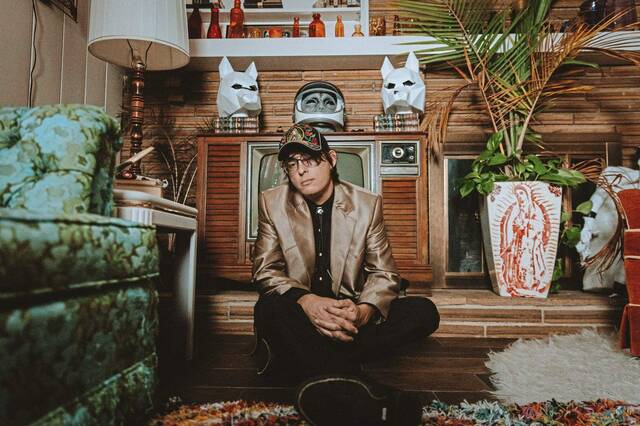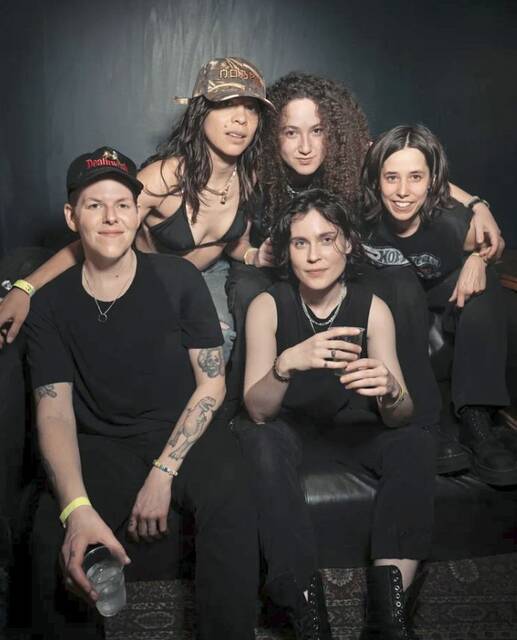Stephen Wilson Jr., a hard-to-label country artist, can’t help but look at songs from a scientific view, having spent several years working in a food-science lab for Mars, Inc.
“I always joke I’m a recovering microbiologist,” Wilson said in a Zoom call earlier this month. “The scientific method is a big part. Science is just a tool. I use that tool to make a living, but it’s just a truth detection tool and the opposite-of-truth detection tool as well, if you use it right. So you can really kind of filter out truths and non-truths with it.”
Those truths are evident in his debut album, “søn of dad,” which just received a new deluxe edition on Jan. 10 and includes two new songs and 10 acoustic renditions. Filled with songs exploring the death of his father, navigating grief, visions of his hometown and more, the album has garnered glowing reviews.
It’s been 16 months since the album’s original release date of Sept. 15, 2023, giving Wilson the opportunity to learn even more about the songs and discover if they ring true.
“‘Cause everything was hypothetical really, so kind of testing it in the world, you start to get some pretty conclusive results when you start experimenting,” he said. “It’s been wild to see the songs also evolve because what I love about records is that they’re records.
“They’re like a recording of a chunk of time — I think of them as a record-keeping exercise — and we have a record of where it was then, and now we’re kind of recording it as we go because that’s the thing with songs, they kind of evolve, they grow just like us.”
And just as the songs have grown, so have the crowds. The majority of Wilson’s winter/spring tour has sold out, including a Feb. 22 date at Thunderbird Music Hall in Lawrenceville. With the larger audiences come more opportunities to, as Wilson said, field test whether his songs are written outwardly or inwardly with the goal of eliminating his bias.
“User bias is a detriment of all great experiments and the detriment of all great results, really. It just ruins the whole experiment. It’s like a house of cards, so you really have to take the user bias out of it or the whole thing crumbles. So there’s that component of it,” he said. “Everything starts for me, as far as songs go, it’s like a hypothesis. I like that. It’s not something that you really know yet. Even when the song is complete, for me it’s still a theory at best and then you go out and test it in the world over and over again in these experiments and these labs — I guess labs being venues.
“Some of my labs in the beginning were venues with maybe three people in it, like a bartender, a sound person and maybe one other person, but you would still get some data. It wouldn’t be a lot, but it would be something better than you had the day before. With science, the greater your participant number is, the greater your data becomes, the more strength your case has, the more conclusive your results are. So now I think if there’s any benefit to what we’re doing as a scientist is that my participant number is much higher. I can actually get way more data way more quickly.
“I spent years making that record because I had so few participants to glean information from. Now I have quite a few more. When you play a new song in front of a thousand people, you get a thousand data points instantly. You can kind of start to plot those out on a map in your head and with your heart and kind of start to figure out what you got, whether it has any truth to it or maybe start that one over or just throw it in the trash.”
Related
• Pittsburgh local band spotlight: The Sewerheads• Indie singer Buffchick talks about debut album, new singles ahead of Pittsburgh show
• 2025 Pittsburgh area concert calendar
In a Zoom chat from his home outside Nashville, Wilson discussed some processing grief through music, how to tackle a Nirvana cover and expectations (or lack thereof) for 2025:
When you were writing the album, was it therapeutic to process the grief through these songs?
They were gifts to help me kind of understand a lot of it. And all I really did was just kind of give them away. I didn’t write the songs for me. They just kind of showed up. I’ve been writing songs for a living and very seriously for quite some time. But when they showed up, I didn’t really know what to do with them. ‘Cause I was a staff writer for years. I was pitching songs to other people. I really wasn’t the guy I thought that would ever be singing them. And now I am.
So when the songs showed up then, there was a little bit more of an unknown, like what is this? But now when songs show up, I have a destination for them quickly. And before the album came out, we didn’t have any fans. So the destination is this kind of ethereal. You don’t know if this is going to land anywhere. But at the same time, you don’t really care, or at least I didn’t care. That really wasn’t the point to write songs so they can land somewhere. It was more just write the songs that show up and then let them kind of do all the heavy lifting after that, and I’ve really written it, I wrote the songs. If anything, I really don’t like — I don’t care for — biographical music, like overly biographical at least, where it’s all about you and all about your story, where you’re kind of writing inwardly. I like to use my experiences in my life to authenticate an emotion, but then after that really try to write outwardly from that point on, so it’s not so much about me. I get very annoyed with me very quickly.
You definitely noticed some evolution in the “søn of dad” songs from where they started to where they are now?
Hell yeah, big time. And just you start to learn a lot about how they affect people. Because the songs, they show up for me for a particular reason, but then they show up for somebody else for something entirely different. And you kind of get to see that manifestation happening over and over again, because there’s just so many different interactions and so many different people, so many different storylines. But at the same time, in the weirdest way, I think we’re all living very, very similar lives, almost parallel lives. So I think that’s what kind of makes it all work, because it’s not individualistic. It’s really not about me. It’s more about them.
It seems like these “søn of dad” songs are universal and relatable to a lot of people like the new one, “I’m A Song.”
It seems like it. It’s a song about songs, and I think everybody in a lot of ways — I come from it internally because I’m a songwriter, like a professional songwriter. I’m not even a hobby songwriter anymore — but I think a lot of people hear songs and they don’t really know why they’re listening to them and they don’t really understand the dynamics of the song and why it’s working. And I think, if anything, that song gives a little bit of an instruction manual or maybe like the blueprints.
You kind of start to see the skeleton of a song and you start to kind of understand it a little bit more. Just like if you were examining something you didn’t understand, you’d want to try to break it down into its components to see how it worked, anything from an engine to biology or whatever. I think it kind of shows some of those mechanisms behind the songs. It kind of shows the carburetor and the alternator. You’re not just getting in a car and driving like you’ve always done. You kind of start to understand the car a little bit.
What songs do you look back on as sort of bookmarks in your life?
There’s quite a few. I mean, there’s a song called “Don’t Take the Girl” (by Tim McGraw) that was a big bookmark for me. I heard it on a school bus when I was a kid. It had been around for a minute, but I’d never really heard it. When I hear that song, every time it takes me to that school bus. If life is like a 10-million-plus page book — and it might be many more pages than that — I feel like songs, it’d be really hard in your mind to go through all the pages and find the paragraph and, hell, the page would be hard to find, let alone the paragraph and the actual sentence. And a song kind of just immediately takes you right to it like a bookmark, like you literally are right there and you see the highlighter on the paragraph and you’re reading it, and that’s how I kind of think of them.
And then there’s lots of rock ‘n’ roll songs that take me so many different places, bands like Death Cab for Cutie and The Postal Service take me back to a lot of my kind of formative young years, and then there’s grunge music and Soundgarden, which took me to some of my more angsty years and also very much formative and trying to interpret what I was going through in life. And it reminds me just of a lot of things, my family and my hometown.
John Mellencamp, dang, every time I hear him, he takes me to so many places in my hometown because he was literally painting my hometown with songs. I find it coincidental that he’s a really accomplished painter, an actual painter. So I feel like he was always painting really, he just had a different medium with songs. And I was fortunate enough to live in his paintings because he was nailing it and I was living in it. So me hearing “Cherry Bomb” or so many songs, like “Check It Out,” I can smell my baseball card packages when I hear those songs and I can taste the bubblegum that came with it, (laughs) the super stale bubblegum that came with the baseball cards. It’s a full sensory experience, just what literally a song that is 45 years old (can do). It’s pretty wild.
You covered Nirvana’s “Something in the Way.” What sparked that and how do you approach making a classic song your own?
I don’t really try to make it my own. That’s really not a deliberate attempt. I’m probably very ADD, and I’m very bad at learning music. I’ve always been bad at copying people perfectly. I was always really good at learning music by ear and learning what they were doing, but I would never get to the point where I’d want to just do it note for note just like them. I would always quickly deviate and kind of go do my own thing and so that’s probably a flaw, a lot of people call that a flaw within musicians, and it’s kind of helped me out in that regard because I don’t really want to play it just like it was played. I quickly drift off and deviate into something else.
That song, I used to just listen to that song over and over and over again as a kid, hiding in my headphones literally just listening to that song. I don’t know why. It’s about a homeless man in Seattle, nothing I could really truly relate to as a farm kid in southern Indiana, but I could really relate to the emotion and the feeling that Kurt (Cobain) was getting, and that’s really what I was feeling. I was feeling what he was feeling, and that’s music in a nutshell. I feel like that’s what I was trying to convey, just kind of capture this aura of it and then really don’t think about anything else after that.
Even chord structure, I tend to mess with that. With “Something in the Way,” I didn’t. I just used the same chords that he used but obviously played them way different. But with some songs like “Stand By Me,” I’d use chord substitutions there. I don’t really change the melody, but for whatever reason, it made more sense to play a minor six instead of a major, like the root chord, and to me it added more emotion and so I’m always trying to get something more out of it that wasn’t originally there. See if there are any more worms under those stones.
I know 2024 was a pretty standout year in your career, so what are you hoping for in 2025?
Just to make it through it, I guess. (laughs) I don’t really have any expectations. I really don’t. I didn’t have any expectations for ‘24. I’d be lying if I said I did. This massively exceeded anything I ever could have expected, so it almost seems a little futile for me to make predictions or to even develop expectations. A lot of this job, whether you’re a songwriter, a musician, a player, whatever it is in this music business, managing expectations is probably one of the most important skill sets you can acquire, even before like musicality, because it’s so much expectation management.
You’re going to experience more rejection in one week than most people experience in a year. You get kind of calloused about it all. So as probably a protective mechanism, I don’t really set them for myself. And so really, I have a sold-out tour in the spring, and I’ve got a lot of other tours that we’re about to announce. And I really just hope, if anything, that I can just show up for each show and each performance or each interview or whatever it is and just be there. That’s all I want. And I don’t really want to be thinking about anything else, if I have my way. Now there’s a good chance I might be thinking about something else, but I’m going to do my damnedest not to.
Just be there, man. I think that’s half the battle.








